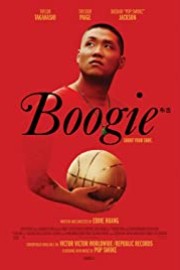Boogie
Coming-of-age movies succeed or fail not by the eventual story point they take their character, but the emotional journey they have gone on. For his directorial debut, writer-director Eddie Huang has a multi-faceted narrative that’s about family, tradition, personal growth, and success in sports. That right there hits a lot of buttons for me as a viewer, but it’s the way he brings it all together is where it finds its success.
There’s an interesting framing device that Huang has going throughout the film, with a couple at a fortune teller discussing their marriage and compatibility, and the pending child they’re bringing into the world. Only later do we see that they are the parents of Alfred “Boogie” Chin (Taylor Takahashi), a phenomenal basketball player from Queens who aspires to play in the NBA. He’s recently transferred to a different high school where he can go against top-flight competition, and set up his future playing basketball. Unfortunately, his “me first” play and bad attitude threaten to derail any hope he might have as a college prospect; the talent is there, but the other things don’t have recruiters pounding down the doors with offers. A key game is coming up where he is to go up against one of the other big, potential recruits in the city, but if Boogie can’t get it together, he may have to take a different route to the NBA than he hoped.
Part of the fabric of Huang’s screenplay are scenes in Boogie’s English class, where the teacher is having them study coming-of-age stories, and in particular, The Catcher in the Rye. While it doesn’t drag the narrative down too much, having such an obvious reference to the type of story being laid out here doesn’t work that much. There is something to be said, however, about the idea of looking at the ways in which the main character carves out his own coming-of-age story, and how the people around him fit into it. By making it explicit, it feels like more of a screenwriting exercise than a narrative, however, which doesn’t add to the authenticity that the rest of the film operates with.
Coming-of-age stories endure because they capture something unique about growing up, and “Boogie” does that in the way the main character’s family dynamics, and the sense of tradition and accomplishment both his mother and father instill in him. Each parent wants the same goal for Boogie, but as the story unfolds, they see different ways for him to accomplish it, and the tension he feels is palpable. The film also reveals itself to be an terrific sports film, however, and the end of that part of the arc is unexpected, but arguably, stronger than if it had just gone in a traditional manner. It’s also more emotionally satisfying, and by the end, “Boogie” is as rewarding a piece of storytelling as anyone has done in any of the genres the film works within.










